Key takeaways:
- Your digital footprint includes all online activity, influencing perceptions and opportunities.
- Managing your digital reputation is essential for personal and professional relationships, especially in the context of potential employers and misunderstandings.
- Utilize tools like Google Alerts and privacy-focused search engines to monitor and protect your digital presence.
- Regularly audit and curate your online accounts by updating profiles and adjusting privacy settings to reduce your digital footprint.
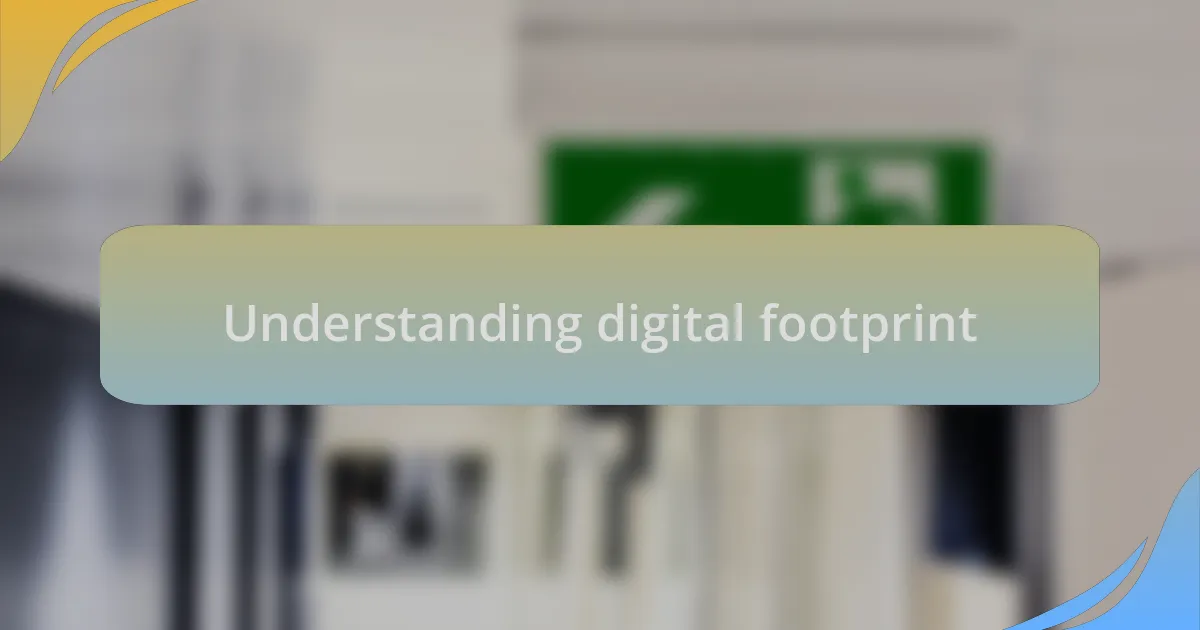
Understanding digital footprint
Understanding your digital footprint is crucial, as it encompasses all the traces you leave online—from social media posts to website visits. I often reflect on the fact that even a simple comment can shape how others perceive me. Have you ever Googled yourself? The results can be surprising and sometimes unsettling.
Every action we take in the digital realm builds a profile that could influence everything from employment opportunities to personal relationships. I remember when I applied for a job; the employer’s first step was to check my online presence. It made me realize just how important it is to actively manage and curate what’s out there.
The concept of a digital footprint can be overwhelming, but it’s also an opportunity for empowerment. I’ve learned to view my online presence as a reflection of my values and interests. Isn’t it empowering to think that you have control over how you present yourself to the world?
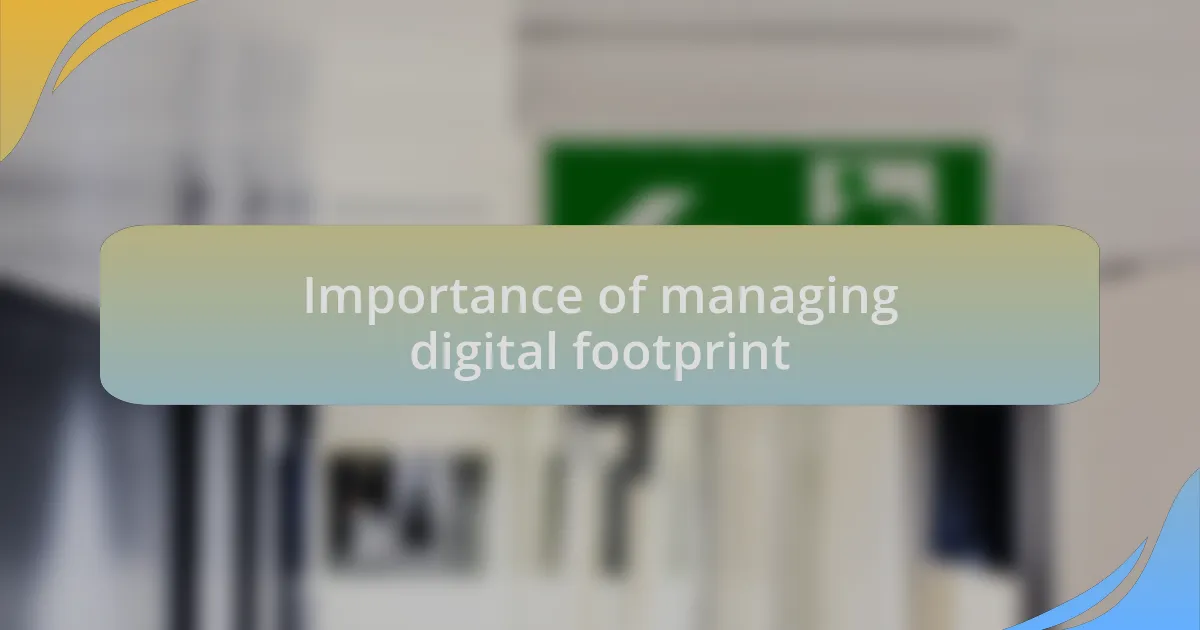
Importance of managing digital footprint
Managing your digital footprint is vital in today’s interconnected world. I recall a friend who faced challenges in his job search because potential employers stumbled upon some outdated, unprofessional posts from his college days. It made me think about how easily someone’s past online behavior can impact their future opportunities. Have you considered what someone might find if they looked up your name?
The implications of an unmanaged digital footprint extend beyond just employment. I’ve seen relationships strain over misunderstandings fueled by social media posts taken out of context. This reinforces my belief that being intentional about what we share not only protects our reputations but also nurtures our connections with others. Shouldn’t we aim for authenticity that fosters trust, rather than a digital trail that invites scrutiny?
Furthermore, the security aspect cannot be understated. When I tightened my privacy settings on social media, I felt a palpable sense of relief. Knowing that I can control who sees my information gives me peace of mind. In a time when data breaches are rampant, isn’t it essential to safeguard our personal information and maintain our right to privacy? Taking charge of our digital footprint enhances our safety in an increasingly digital landscape.
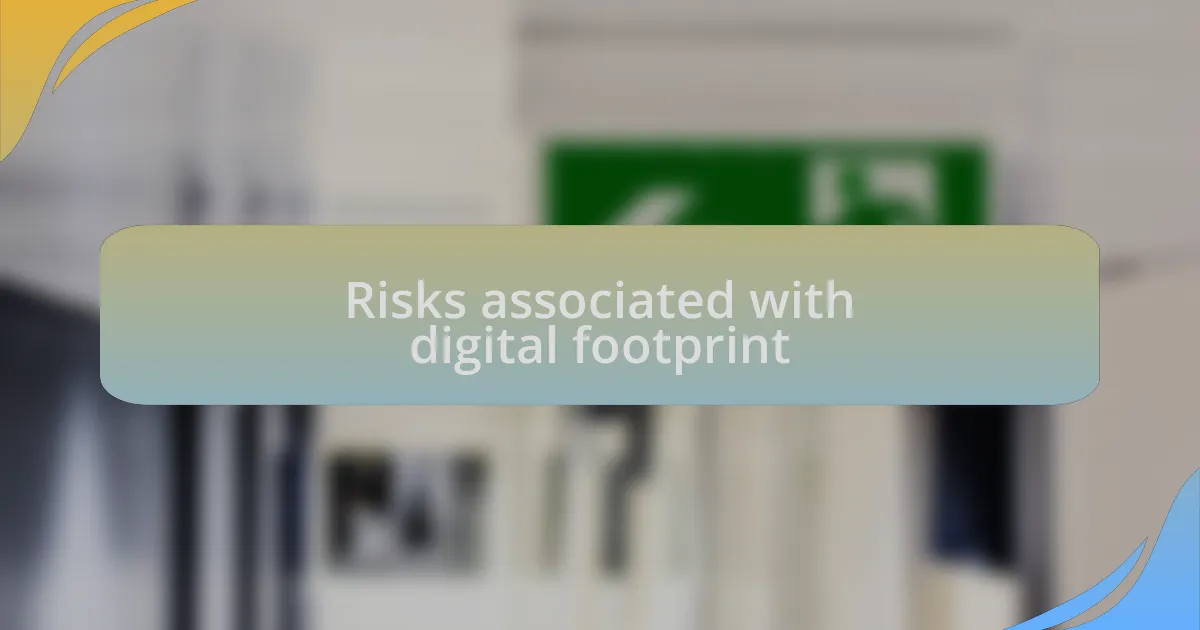
Risks associated with digital footprint
When it comes to the risks associated with a digital footprint, the potential for identity theft is daunting. I remember a colleague who had their social media accounts hacked, sending distressing messages to friends and colleagues alike. It not only damaged their personal reputation but also created confusion and mistrust among their network. How many times have you shared personal details online, thinking they were harmless?
Another concern is the permanence of online information. I’ve often wondered about the long-term implications of a seemingly innocuous post. A casual comment from years ago can resurface and be misinterpreted in today’s context, sometimes leading to severe backlash. Isn’t it eye-opening that a moment of poor judgment can echo through our lives indefinitely?
Privacy erosion is a significant risk too. I once attended a seminar where they explained how easily our data can be purchased and sold without our consent. Realizing that my interests and behaviors could be tracked and exploited felt invasive. Isn’t it worth reconsidering how much information we relinquish online and to whom? Managing my digital footprint isn’t just a personal choice; it’s a necessity in navigating today’s complex digital landscape.
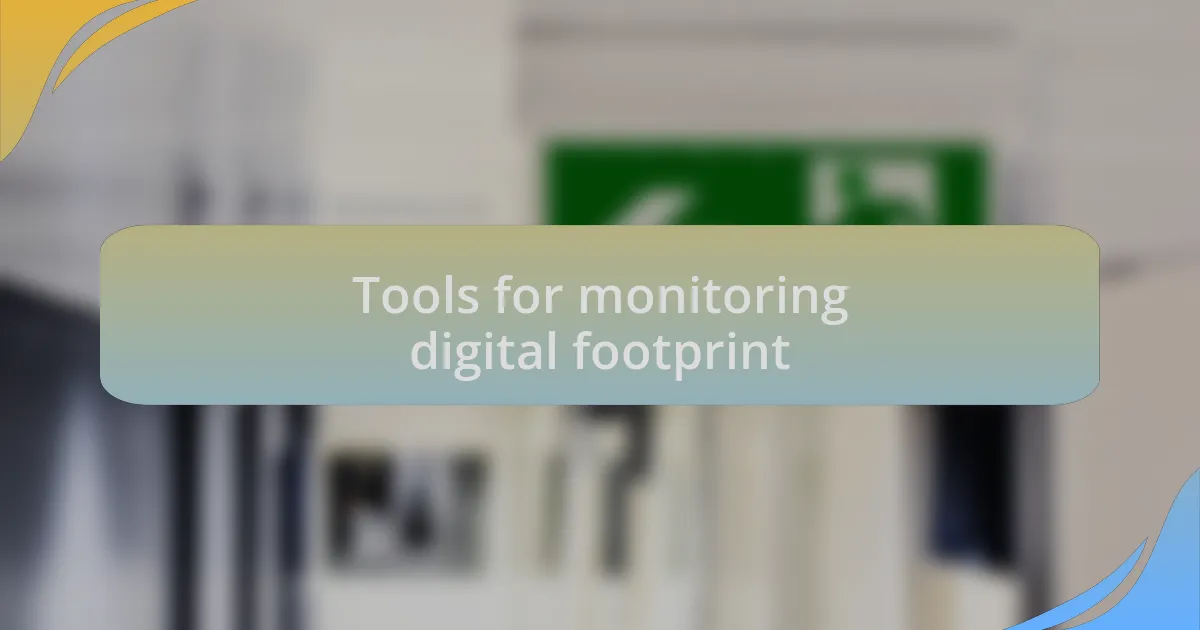
Tools for monitoring digital footprint
When it comes to monitoring my digital footprint, I rely on various tools that make the process straightforward and comprehensive. One of my go-tos is Google Alerts, which notifies me whenever my name or specific keywords pop up online. It feels like having a digital watchguard in place—seeing those alerts gives me peace of mind, knowing I can react quickly if something concerning comes up.
I’ve also found that privacy-focused search engines, like DuckDuckGo, help reduce the data collected on my online activities. Switching to it was a small yet pivotal change. I think about it this way: the less data I give away, the less likely I am to have that information misused. Have you ever thought about how often you use search engines without considering what information you’re sharing?
For a deeper dive, I use tools like Privacy Badger and Ghostery, which actively block tracking cookies on websites I visit. It’s quite illuminating to see how many trackers are working behind the scenes! The comfort that comes from knowing I have control over who sees my data is profound. How empowering is it to reclaim some privacy in this digital age?
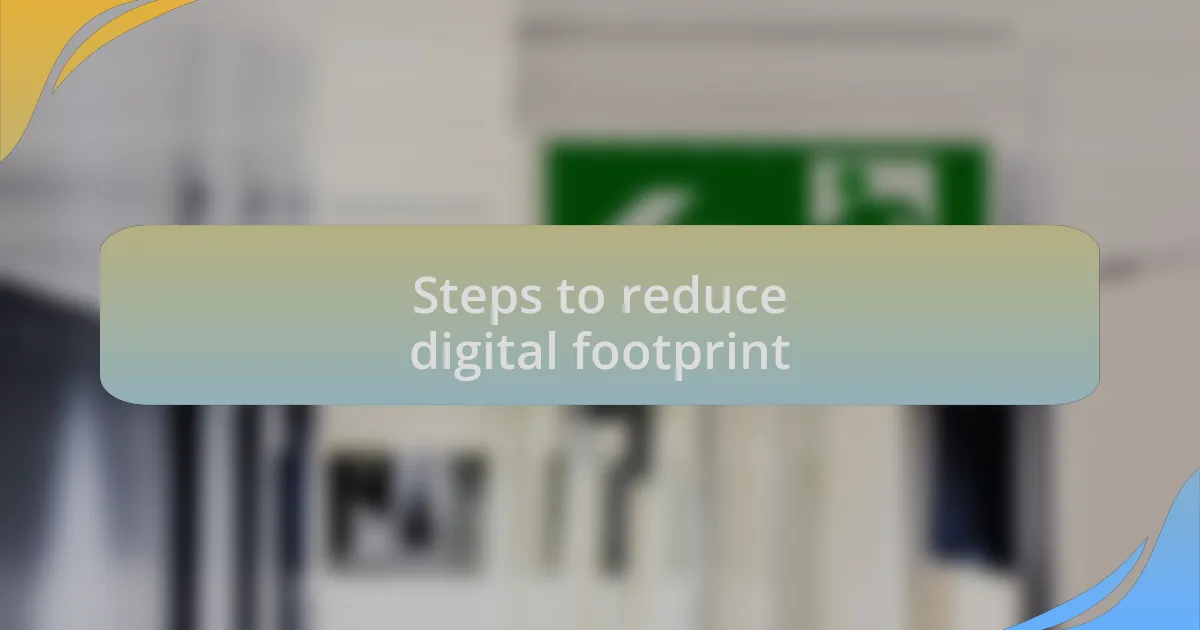
Steps to reduce digital footprint
Reducing my digital footprint starts with a simple evaluation of my online accounts. I often find myself going through my social media profiles and deleting any old posts or photos that no longer reflect who I am. Reflecting on the past, I realized that some of my posts were not only embarrassing but also might give a skewed perception of me to others. Have you ever gone back and cringed at your old online self?
Another significant step I take is reviewing the privacy settings on my accounts frequently. I can’t stress how valuable it has been to limit who can see my information. A few weeks ago, I changed my settings on a popular networking site, and it was surprising to see just how many former connections had access to my profile. It made me think—am I really comfortable with potential employers or strangers sifting through my past?
Finally, I make a habit of unsubscribing from newsletters and services I no longer use. Just last month, I unsubscribed from numerous email lists that cluttered my inbox. It felt freeing, as if I’d just decluttered a digital closet that I didn’t realize was overflowing. Simplifying my online presence not only lessens my digital footprint but also helps me focus on what truly matters in my digital life. Are you ready to do a little spring cleaning in your digital space?
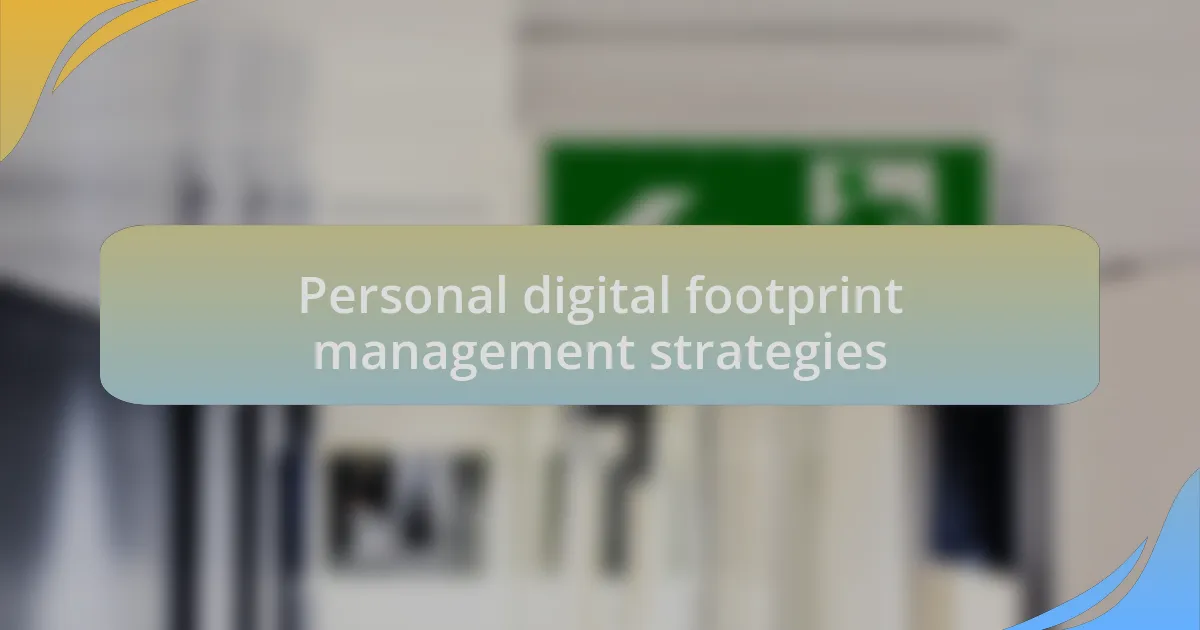
Personal digital footprint management strategies
Managing my digital footprint effectively requires a bit of planning and conscious effort. One strategy I find particularly helpful is curating my online presence to ensure it accurately represents my current self. For example, I took the time to update my LinkedIn profile, not just to reflect my current job title but also to showcase new skills I’ve developed over the years. It’s surprising how many people overlook this—do you ever wonder what first impression your profile leaves on others?
Another approach I utilize is being mindful about the information I share. I remember a time when I posted a seemingly harmless photo from a recent trip. Later, I realized that it had revealed my location and left details that could make me vulnerable. It’s crucial to ask ourselves often: is this information necessary? When I focus on the essentials, I find that I can connect with others while minimizing risk.
I also conduct a regular audit of my digital presence, including search results associated with my name. Once, I discovered a long-buried online article from my college days that I didn’t want associated with my professional identity. It taught me the importance of being proactive in managing visibility—what might your digital history say about you? Keeping tabs on my online reputation allows me to maintain control and peace of mind in an increasingly digital world.